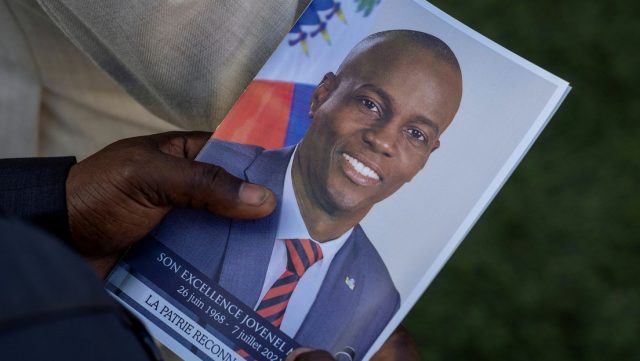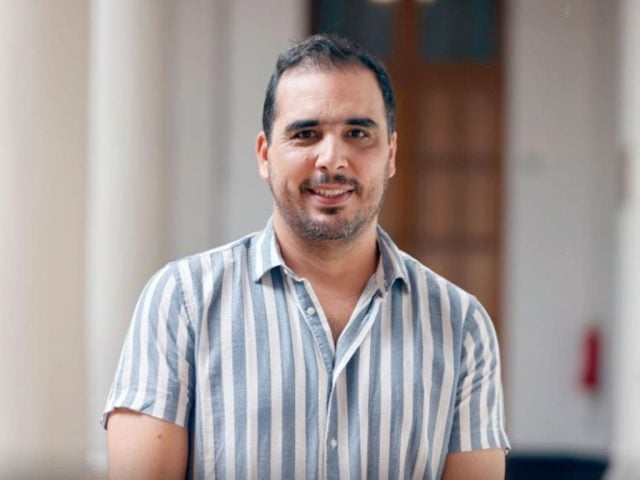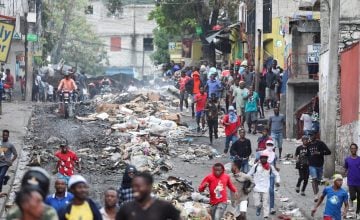Colombia would be seeking «to give another direction to history so that the origin of the mercenary expression and the export of paramilitarism is not investigated».
The truth about the assassination of the president of Haiti, Jovenel Moïse, seems increasingly difficult to elucidate. Since the assassination occurred on July 7, a series of revelations, different versions and leaks to the press show how the case directly splashes the countries that are collaborating with the investigations: Colombia and the United States.
One point that draws attention is the way in which Bogotá has approached the situation, specially after the participation of, at least 18, former Colombian military personnel in the assassination, captured in Port-au-Prince, was revealed. The Government of Iván Duque has assured that the mercenaries «were deceived».
The main spokesperson for the House of Nariño has been the Foreign Minister and Vice President, Marta Lucía Ramírez, who has led the efforts so that the relatives of the ex-military are allowed to travel to Port-au-Prince and also, to make possible the repatriation of the bodies of three of the assailants. who were killed in clashes with the Haitian police, indicates a report by RT.
The focus in Haiti
The US has also been involved in the events, not only because it offered health care to the former first lady, Martine Moïse, but because at least seven of the Colombian mercenaries were trained by the Pentagon. Following these revelations, both Washington and Bogotá reported that they would send teams to Port-au-Prince to investigate the crime.
The White House sent senior officials from the FBI and the Department of Security to «support» the request of the Haitian Minister of the Interior, Claude Joseph, who asked Interpol and the US and Colombian security agencies for «investigators».
In Bogotá, the Defense Minister, Diego Molano, assured that the military force and the police of his country would provide «all the collaboration in the clarification of the assassination». Meanwhile, the police from that country confirmed that the alleged murderers of Moïse had left on two flights from Colombian soil, planned the crime between Haiti, the United States and the Dominican Republic, and that at least four companies were responsible for recruiting the commandos.
However, on July 16, the ‘discursive turn’ from Bogotá began. That day, Vice President Ramírez gave controversial statements about the dispatch to Haiti of a consular mission that would assist the detainees and manage the repatriation of those killed.
Days later, the US State Department created the figure of the «special envoy for Haiti», headed by Daniel Foote, to collaborate «with Haitian and international partners», «to facilitate lasting peace and stability», and also to support the «efforts to hold free and fair presidential and legislative elections».
In the midst of the controversy, the widow and former first lady of Haiti, Martine Moïse, —the only eyewitness to the murder— denounced that her husband made dangerous and powerful enemies because, in her opinion, he tried to terminate State contracts from which the corrupt ‘oligarchy’ profited from.
«Is it a crime to want to free the State from the clutches of corrupt oligarchs?», asked the former first lady during her husband’s funeral, where she demanded that the «true perpetrators» of the assassination be found. She described the assassins as «birds of prey» who are still at large, «thirsty for blood» and with the intention of driving away any other leader who intends to make reforms in the country.
Colombia: «They were deceived»
Colombian Vice Minister Francisco Echeverri was in charge of having permanent contact with the families of the detainees and with the Haitian ambassador in Bogotá, Jean Mary Exil.
Meanwhile, the vice president – former Defense Minister between 2002 and 2003 in the Álvaro Uribe Vélez government – took advantage of this context to defend «the soul of the Colombian soldiers» and assured that «never a Colombian military man» would be able to think «in the hypothesis of participating in a magnicide».
The vice president insisted that several of the mercenaries «unfortunately» had been «deceived». According to her, although «some of the Colombians who went to Haiti knew what it was about», «the majority went on another mission» which supposedly consisted of «supporting the security forces» of that country.
«I know perfectly well that the Colombian military are never, under any circumstances, mercenaries who are going to go on duty to commit any type of crime anywhere», said Ramírez, despite knowing that a large number of retired soldiers end up hired by foreign security companies to act in armed conflicts.
The Foreign Minister, who has been concerned about the «negative image» of her country due to these events, has reported that the honorary consul of Colombia in Haiti, Julio César Santa, visited the inmates and verified that they had received a «medical assessment» and they are «in better conditions».
In fact, she has been insistent in promising that her government will give «consular assistance» to the 18 detainees, «so that they have humanitarian guarantees and due process is respected». This Thursday, she announced that they will look for a lawyer to defend them and that, if they have the possibility of taking the case to an international entity, they will do so.
Colombia seeks to divert attention
For the human rights and migrant activist Juan Carlos Tanus, the assassination of Moïse has exposed the complex situation within the Colombian Army, «which has become the largest exporter of mercenaries for private military security companies».
In an interview for RT, Tanus asserted that every year «some 15,000 soldiers with high military training» leave the Colombian Army, which end up being «highly sought after» by private military contractors such as theBritish G4S or the US CTU Security LLC (investigated for the assassination of Moïse).
For these operations, the soldiers receive large amounts of money through legalized companies in Colombia that, according to Tanus, have links with paramilitarism and drug trafficking networks.
In fact, the Venezuelan ambassador to the UN, Samuel Moncada – who last week introduced a document before the Security Council to investigate «mercenary operations» that link the United States and Colombia – denounced that the Colombian mercenaries form part of a transnational narco-paramilitary crime network, which allegedly has the support of the Colombian State and «its propaganda apparatus» to ‘launder’ their criminal acts.
«This is a disinformation operation in progress against Haiti», said Moncada, who assured that the Government of Colombia and the media in that country seek to «impose the narrative» that the mercenaries are «heroes» and «military gentlemen», who «were allegedly deceived by corrupt Haitians». For the Venezuelan diplomat, this version is «a second aggression against Haiti».
In this regard, Tanus agrees: «The Government of Colombia came out very quickly to try to organize the process of investigating the events in Haiti and tried to produce a cloak that would allow it to divert attention and cover up what is happening». According to the Colombian activist, the mercenary companies are also associated «with current government political actors», and have a «close relationship» with economic actors from the US, Israel and the United Kingdom.
For example – he comments – it is «very profitable» for these countries to hire ex-Colombian military personnel, an issue that is evidenced by the «serious antecedents» of their participation in the conflicts in Iraq, Syria, Afghanistan or Yemen. «Marta Lucía Ramírez and other officials are linked and committed to Colombia’s second largest export product, paramilitarism, which has become international mercenarism», denounces Tanus.
For him, it is clear that the speed with which Colombia has reacted, after the scandal over the assassination, has been because they seek to “give another direction to history so that the origin of the mercenary expression and the export of paramilitarism is not investigated, which generates more than 50,000 million pesos [about 13,000 million dollars] annually, which is only exceeded by cocaine drug trafficking».
While the events are unfolding, the discourse of Colombia and some of the media in that country continues to be aimed at treating the mercenaries as victims, who the day before admitted their responsibility in the magnicide via audios that were made public, in an unprecedented way, by Noticias Caracol.











